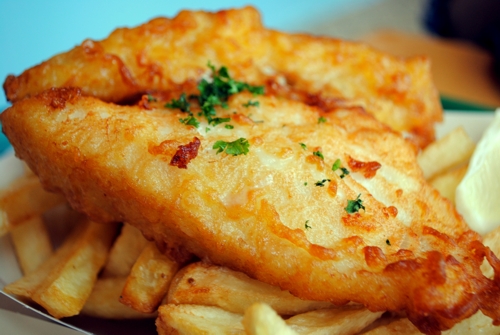You’ve probably heard the old maxim that ‘Fish is Brain Food’. Anecdotal evidence and studies of Fish consumption over various cultures have tended to support the theory, in general. But now, researchers at the University of Pennsylvania have discovered that Omega-3s are important to sleep, a brain health partner…
Good Old Fish and Chips is no longer the cheap take-out treat it used to be.
Fish costs a fortune! Don’t just drop it from your diet. But shop the sales
and only splurge on ‘fresh’ if you’re doing Sushi…
Regular Fish consumption has been shown to improve cognition. It’s also been known to help with sleep. A new study connects all three for the first time. The team found that children who eat Fish at least once a week sleep better and have higher IQs by an average of 4 points.
Previous studies showed a relationship between omega-3s, the fatty acids in many types of Fish, and improved intelligence, as well as omega-3s and better sleep. But they’ve never all been connected before. This work, conducted by Jianghong Liu, Jennifer Pinto-Martin and Alexandra Hanlon of the School of Nursing, and Penn Integrates Knowledge Professor Adrian Raine, reveals sleep as a possible mediating pathway.
How it works…
“Lack of sleep is associated with antisocial behavior; poor cognition is associated with antisocial behavior,” said Raine. “We have found that Omega-3 supplements reduce antisocial behavior, so it’s not too surprising that fish is behind this.”
Pinto-Martin adds: “[Our research] adds to the growing body of evidence showing that fish consumption has really positive health benefits and should be something more heavily advertised and promoted. Children should be introduced to it early on.”
That could be as young as 10 months, as long as the fish has no bones and has been finely chopped, but should start no later than around age 2. But there are some potential drawbacks for parents in cultures in which Fish is not a front-line protein.
“Introducing the taste early makes it more palatable,” Pinto-Martin says. “It really has to be a concerted effort, especially in a culture where fish is not as commonly served or smelled. Children are sensitive to smell. If they’re not used to it, they may shy away from it.”
Bottom line?
It’s definitely worth getting your kids started on fish early, Pinto-Martin says.
Benefits for older kids and adults?
Pinto-Martin says her team’s research only relates to very young kids in their formative years. But she also recommends further research on he connection between intelligence, sleep and Omega-3s. Who knows what we’ll discover?
Meanwhile, keep eating your Fish at least once a week and take your Omega-3 supplements!
~ Maggie J.


